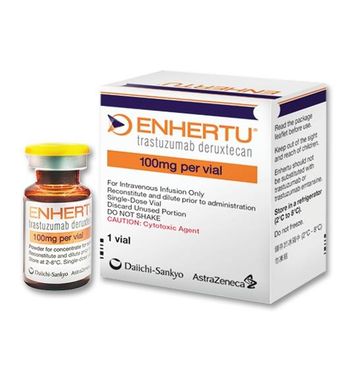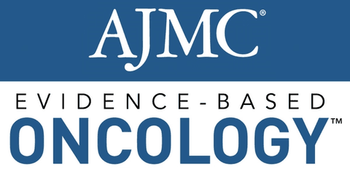
Friday's keynote speaker, Katherine A. Meese, PhD, addressed the conference theme of workforce support at the Association of Cancer Care Centers 50th Annual Meeting and Cancer Center Business Summit.
Mary Caffrey is the Executive Editor for The American Journal of Managed Care® (AJMC®). She joined AJMC® in 2013 and is the primary staff editor for Evidence-Based Oncology, the multistakeholder publication that reaches 22,000+ oncology providers, policy makers and formulary decision makers. She is also part of the team that oversees speaker recruitment and panel preparations for AJMC®'s premier annual oncology meeting, Patient-Centered Oncology Care®. For more than a decade, Mary has covered ASCO, ASH, ACC and other leading scientific meetings for AJMC readers.
Mary has a BA in communications and philosophy from Loyola University New Orleans. You can connect with Mary on LinkedIn.

Friday's keynote speaker, Katherine A. Meese, PhD, addressed the conference theme of workforce support at the Association of Cancer Care Centers 50th Annual Meeting and Cancer Center Business Summit.

The session at ACCC's 50th Annual Meeting & Cancer Center Business Summit featured discussions on patient navigation, addressing patients' sexual health, needs of LGBTQ+ patients, and more.

Coverage from the Association of Cancer Care Centers’ 50th Annual Meeting & Cancer Center Business Summit.

ONCare Alliance will be led by 2 of the leading women in community oncology, cochairs Barbara McAneny, MD, of the New Mexico Cancer Center, and Sibel Blau, MD, of Northwest Medical Specialties, PLLC, of Puyallup, Washington.

Quality Improvement (QI) projects require a series of distinct steps and timely data collection that will allow clinics to see if changes are yielding results, a consultant told attendees at a preconference workshop at ACCC.

The newly rebranded Association of Cancer Care Centers (ACCC) celebrates its 50th year at this week's business meeting.

An on-body delivery system approved last fall for paroxysmal nocturnal hemoglobinuria (PNH) has seen rapid uptake and is now being studied for use with isatuximab.

In this final part of our interview with James Robinson, PhD, MPH, he underscores the need for employer education about the health plans they offer, fostering managed competition among hospital systems to drive down costs, and innovation in financing drug development.

Approved in Europe, tabelecleucel may soon be considered by FDA to treat patients who develop Epstein-Barr virus following a transplant, which then triggers a type of deadly lymphoma that may not respond to traditional therapy. Tab-cel, an allogeneic T-cell therapy, comes 30 years after the discovery that T cells might offer hope, followed by decades of research on how to harness them without the side effects.

In part 3 of our interview with James Robinson, PhD, MPH, he discusses the need for reforms to commercial insurance that reflect the changes to Medicare under the Inflation Reduction Act, how the 340B drug pricing program has veered widely from its original goals, and ongoing cost sharing struggles among patients, insurers, hospitals, and drug companies.

In part 2 of our interview with Robinson, he addresses the potential for exacerbated health care disparities in the aftermath of hospital price markups and how insurance plan design often disadvantages the patients who most need expensive infusion therapies but cannot afford them.

Besides the new approval, AstraZeneca released preliminary results for LAURA evaluating osimertinib after chemoradiotherapy.

In the January issue of The New England Journal of Medicine, James Robinson, PhD, MPH, and his fellow investigators published their findings from an analysis of how insurer drug expenditures on infused drugs influenced price markups at hospitals.

Business and practice updates from our Strategic Alliance Partners.

Coverage from the session, "Bringing Health Equity to Clinical Trials at Every Step," at Patient-Centered Oncology Care 2023.

Coverage from the session, "Which Comes First? Bispecifics, CAR T-Cell Therapy, and Cost Consideration in Sequencing,” at Patient-Centered Oncology Care 2023.

Coverage of Tennessee Oncology's Johann Brandes, MD, on "Precision Medicine in NSCLC."

MD Anderson's Ryan Huey, MD, offers a survey of research on a holistic approach to addressing financial toxicity during Patient Centered Oncology Care 2023.

Coverage from the discussion, "Cancer Genomics: The Gateway to Access and Health Equity” on the first day of Patient-Centered Oncology Care 2023.

Kathryn E. Hudson, MD, of Texas Oncology was a featured speaker at Patient-Centered Oncology Care 2023.

FDA has approved budesonide oral suspension to treat patients 11 years of age and older with eosinophilic esophagitis (EoE). The oral therapy, to be sold as Eohilia, will be available by the end of February, according to sponsor Takeda.

A tumor-agnostic approval would be a significant development in the advance of antibody-drug conjugates (ADCs), which are designed to deliver a potent, cancer-fighting payload into a tumor while sparing nearby tissues.

Selected coverage of myelodysplastic syndromes and myeloproliferative disease at the 65th American Society of Hematology Annual Meeting and Exposition, December 9-12, 2023, San Diego, California.

Selected coverage of multiple myeloma from the 65th American Society of Hematology Annual Meeting and Exposition, December 9-12, 2023, San Diego, California.

Selected coverage of acute lymphoblastic leukemia (ALL) from the 65th American Society of Hematology Annual Meeting and Exposition, December 9-12 2023, San Diego, California.

Selected coverage of classical Hodgkin lymphoma (cHL) from the 65th American Society of Hematology Annual Meeting and Exposition, December 9-12, 2023, San Diego, California.

Selected coverage of mantle cell lymphoma (MCL) from the 65th American Society of Hematology Annual Meeting and Exposition, December 9-12, 2023, San Diego, California.

Selected coverage of chronic lymphocytic leukemia (CLL) and small lymphocytic leukemia (SLL) from the 65th American Society of Hematology Annual Meeting and Exposition, December 9-12, 2023, San Diego, California.

One expert said the results have the potential to change the standard of care for some patients with the most common type of liver cancer.

The PD-1 inhibitor is being studied in multiple cancers; FDA is reviewing an application of a combination with rivoceranib in unresectable hepatocellular carcinoma.

259 Prospect Plains Rd, Bldg H
Cranbury, NJ 08512
© 2025 MJH Life Sciences®
All rights reserved.
